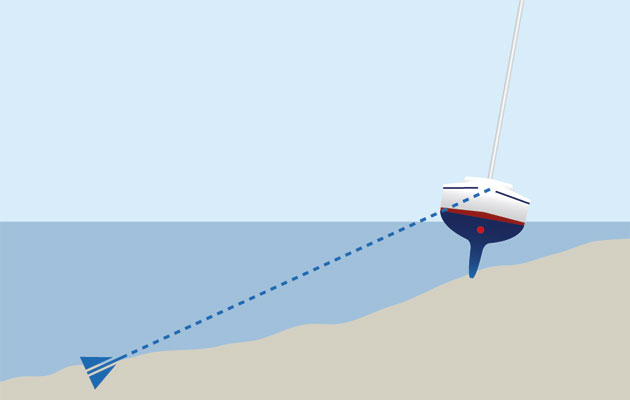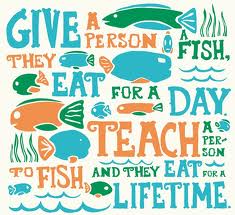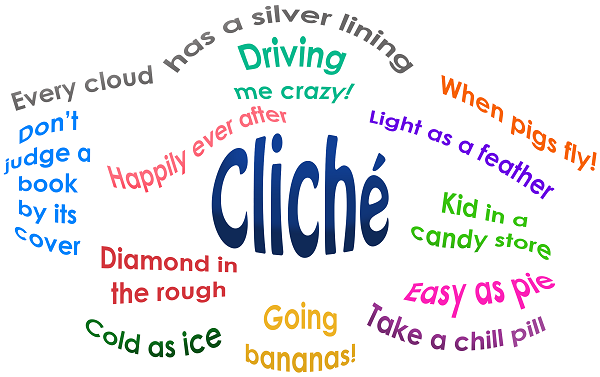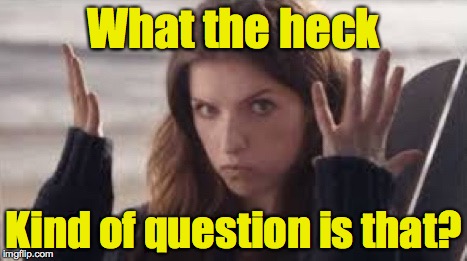A
question, by its very nature, invites or assumes responses. That is why questions are such powerful tools
for learning and developing ideas. By asking questions, we enhance the speed,
quality, and quantity of our learning. But
not all questions are alike: the better our questions, the better the answers.
Questions
are often triggered by the wh words: who, what when, where, why, and how.
Yes, and how. Originally, how was spelled and pronounced whow. Questions can also start with words such as do, can, are, is, were, if, and has, but, as you will soon see, questions
triggered by these words do not generate quite the same quality of responses as
the wh words do.
To
effectively ask and field questions, let’s distinguish several kinds:
(1) Good questions
(2)
Key questions
(3)
Unfair questions
(4)
Yes/No questions
(5) One-answer questions
(6)
Rhetorical questions
Good Questions
“Why
are our hearts on the left instead of the right side of our human bodies?” “Why do supermarkets place toothbrushes at
adult eye level and not alphabetize soup cans?”
“How do Christians argue for the existence of God?” “Why do some people
become alcoholics?” “How can we save the ozone layer?” “What might cure Alzheimer’s disease?” “What
happened to Uncle Frank so that no one in the family talks about him?” These are examples of good questions. Students of
language notice that good questions
tend to
ü Respond to an important human need
ü Are focused and specific
ü Promote thought
ü May question popular beliefs
ü Invite multiple, often conflicting answers
ü Lead to other questions
ü Suggest how they might be answered
ü Lead to good answers
ü Elicit an aha
response
ü May cause strong emotional responses
ü May meet with resistance
ü Can lead to collaborative work for answers
ü Make us respond with “That’s a good question!”
For example the question “How might we preserve
the ozone layer?” is a good question because it responds to an important human
need—to health of planet earth. The
question makes us think, has more than one answer, and leads to other questions
about the environment. The question has
led to good answers by people who have collaboratively pursued answers to the question. It isn’t a trick or unfair question. It leads people to say, That’s a good question. Whether in a classroom, lab, conference
room, assembly, or family table, good questions generate lively discussions and
promote inspiring challenges.
Key Questions
The
key question driving this post is “What the heck kind of question is that?” If we were to formulate key questions for the
Bible or the Koran, they might be “Who is God?” and “How can we best serve God?” Whether or not questions are explicitly posed
by an author, as readers, formulating key questions for the text will help us
to read more deeply. For the most
effective texts, the key questions are the good
questions. When the good question is not
explicitly posed, here are some ways to formulate them for what we read:
ü Posit a point of view of the author
ü Identify a purpose for why the author might be writing
ü Choose what seems to be an important purpose
ü Formulate this purpose as a wh question
As a writer, articulate your own sense
of why you are writing a particular piece. Ask
yourself these questions:
ü Why am I writing this?
ü What do I hope to discover in my writing process?
ü Who am I addressing as my ideal reader?
I find that whenever I am at a stopping
point in a particular piece of writing,
I turn my most recent sentence into a
question to relaunch my flow. So, for example,
I
will turn my previous sentence into a
question: “If I come to a stopping point
in a particular piece of writing, how might I relaunch my flow?”
Unfair Questions
“Are
you still beating your dog?” “What’s the difference between a duck?” “How come
someone says they saw you did it?” “You don’t want another piece of my pie, do
you?” “What is it like to be blown up by a bomb?” These and other such questions are unfair because
they
ü Assume something illegitimately
ü Are meant to trick responders
ü Often exact only one answer
ü May be unanswerable
ü Antagonize and confront
ü Lead or manipulate
For example, the question “Are you still
beating your dog?” is unfair because
it assumes that you beat your dog in the
first place. You can’t win. If you say “Yes,” then you are admit to beating
your dog. If you say, “No,” then you still
admit to having beaten your dog. The
question is confrontational and antagonistic.
In a
court of law, the opposing counsel would
object that it is a “leading question.” A fairer
approach would be to first ask, “Have
you ever beaten your dog?”
In an earlier blog, “Martha and
Mary,” I had originally asked an unfair question:
“How are your
teachers more Martha than Mary?” That
assumed that your teachers were more Martha and Mary. When a responder pointed out it was a leading
question, I revised it to “Are your teachers more Martha or Mary?”
Some
questions might be unfair because of the context in which they are asked.
For example, it could be unfair and embarrassing to
ask a person, “Is that a new hair dye?” at a formal dinner. But it can be entirely appropriate for a
hairdresser to ask this question of a client in the salon.
How
you phrase a question is crucial. The
question “What happened to
Uncle Frank?” may be a good question, whereas “What did
you do to Uncle Frank?”
is not. The question
“What’s the difference between a duck?” is nonsensical. But when comedian Grouch Marx asks it, the
question isn’t unfair—it’s funny.
Yes/No Questions
“Is
there an afterlife?” “Have you gone to the store?” “Are there moons around
Jupiter?” “Will there be enough ozone layer left at
the end of the twenty-first century?” “Should there be an extra microphone for
the event?” “Can you loan me some money?”
Such questions are yes/no questions because they invite just that—yes or no. They
ü Begin with some form of the words is, can, do, has, could/would/should,
or will
ü Do not
invite discussion or collaboration
ü Limit the range of acceptable responses
ü May be too general
ü Can be unfair, given the context
One-Answer Questions
“How
much is 2 + 2 in the decimal system?” “What was the cause of the Civil
in America?” “Who is the main character in Chaucer’s Canterbury Tales?” “What
is the most important trait of a responsible thinker?”
“Would any sane person ever
want to kill an innocent child?” Or, my favorite question to avoid asking
students: “What is the main point of this text?” Such one-answer questions
ü Assume there is only one right answer
ü Occur most often in courses focused on information,
not thinking
ü Create a guessing-game atmosphere
ü Can be satisfying to answer “right,” embarrassing to
answer “wrong”
ü May create corrosive competition
ü May preclude questioning the question’s validity
For
example, the question “What as the
cause of the Civil War in America?” assumes, by the use of the word the, that there was one and only one cause of the war. Similarly, the question “What is the main point?” may shut down creative and critical thinking. If the questions were posed by a teacher in a class, it
could create a “guess what the teacher’s thinking” game. Some students would settle
for guessing, others might compete to be the first to say. Students who don’t want to play, might give
up, feel defeated, retreat into boredom, and sneak their phones.
Rhetorical Questions
“Would you
starve the children?” “How many people lost their lives to overdose?” “What
more could we have done to save them?”
Sometimes answers to such questions are meant to be so obvious—No, countless, nothing (respectively)—that
the questions are not meant to be answered.
They assume a particular answer and are used to affirm agreement.
If a question is not a request for an answer but a strategy
to persuade an audience of a predictable answer and point, it is called a rhetorical question (as the word rhetorical means “meant to persuade”). Rhetorical
questions
ü State, don’t ask
ü Are often used in rousing speeches and texts
ü Are meant to impress
ü Make a point without stating it
ü Imply one acceptable answer
ü Preclude an answer
ü Manipulate
Notice
that context—purpose and audience—determines whether a question is rhetorical. A villain might ask “Would you starve the
children?” as a request for an accomplice to do so. A writer seeking statistics to support an
argument for research on drug-use is not
merely posing a bemoaning rhetorical question when asking “How many have died
in this epidemic?” A Red Cross volunteer asking, “What more could we have done
to save them?” is posing a good question, not merely a rhetorical one.
Explore Questions
In
your classes, notice what kinds of questions are favored in class, and in assessment
instruments such as essays and tests.
Learn to discern what the heck kinds of questions your teachers are
asking and, if they are not asking good questions, how you might turn discussions
to asking them, yourself. Here are some
procedures you might take:
1.
Remind yourself:
The only dumb question is the one not asked.
2. Use the wh
words: Who, What, When, Where, Why,
(W)how
3.
Analyze select questions
by asking
a.
What the heck
kind of question is this? Good, key, unfair,
yes/no,
one-answer, rhetorical, undetermined?
b.
What kind of
response does this question anticipate?
c.
How could I
revise this question into a good question?
4.
Formulate key
questions for authors and in your own writing
5.
Practice
answering anticipated questions
6.
Ask questions throughout
your learning and writing process
7.
Repeat for
questions in other important areas of your life: family, relationships,
financial, spiritual, professional, et al.
Works Cited:



